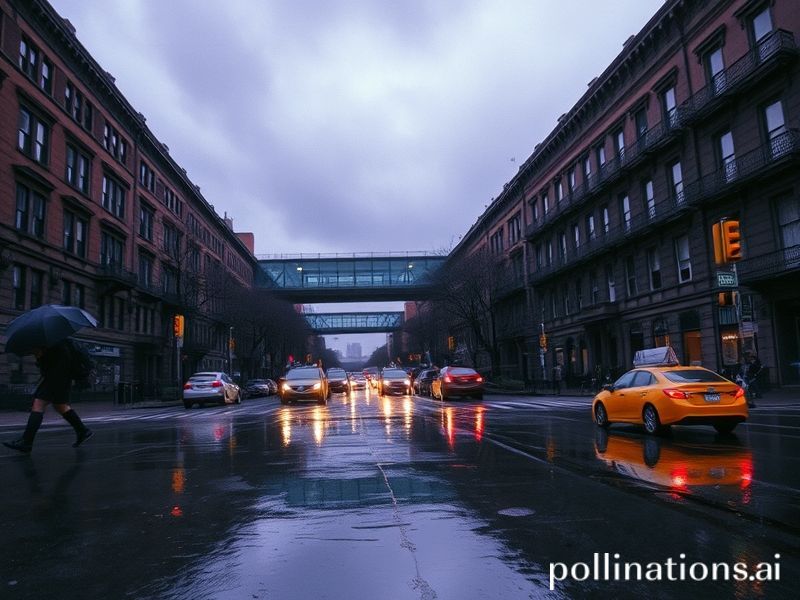From Fort Greene to Fortress World: How Brooklyn’s Drizzle Became the Planet’s Barometer
Brooklyn’s Weather Report, or How a Drizzle in Fort Greene Became the Planet’s Thermometer
By a correspondent who has filed from both the Sahel and a Williamsburg coffee queue
NEW YORK—While the rest of the world was busy arguing about carbon taxonomies and whether the Arctic will be beachfront property by 2035, Brooklyn woke up this morning to a sky the color of an overpriced oat-milk latte and a humidity index that felt like being slow-roasted inside a tote bag. Locals called it “muggy”; climatologists in Geneva quietly updated global sea-level models. Same event, different spreadsheets.
On the face of it, Wednesday’s forecast—low 70s, intermittent drizzle, a 40 % chance of existential dread—doesn’t scream geopolitical flashpoint. Yet in the great ledger of planetary risk, the borough’s microclimate has become a proxy for everything from Chinese supply-chain resiliency to whether the Bundesweg will need new amphibious troop carriers. The reason is as cynical as it is simple: if Brooklyn’s basements flood, odds are Lagos ports are already underwater, and Rotterdam is shopping for bigger dikes.
Consider the supply chain for lithium, that mood-stabilizing element now prized more than therapy. A two-hour downpour on the BQE doesn’t merely send Uber surge prices into the stratosphere; it also delays a convoy of trucks hauling anodes from Wilmington to Red Hook, which in turn idles a Shenzhen battery plant that powers half of Europe’s e-bikes. By the time your average Park Slope resident has finished Instagramming puddle reflections, a factory in Guangdong has missed quarterly targets, and the CFO is Googling “Swiss citizenship requirements.”
Meanwhile, Parisian diplomats sipping Sancerre at COP-adjacent side-events note that New York’s new rainfall records read like a dispatch from the future they keep promising to finance but never quite do. Brooklyn’s “100-year storm” now arrives every presidential election cycle—convenient timing for campaign ads featuring rolled-up sleeves and sandbag photo-ops. International observers have begun treating the Gowanus Canal as a case study in what happens when late-stage capitalism meets early-stage hydrology. The canal, for the uninitiated, is a Superfund site so polluted that its sediment could qualify as a minor nation-state; add a six-inch rain bomb, and you get a cocktail potent enough to dissolve civic complacency.
Of course, the human response is predictably performative. A boutique startup in Dumbo is selling artisanal sandbags—undyed hemp, naturally—at thirty-five dollars a pop. Their marketing copy promises to “elevate disaster preparedness into a lifestyle.” Sales have tripled since Berlin logged its hottest April since Charlemagne. Somewhere in Dhaka, a 14-year-old who has never seen a subway map is stacking actual sandbags to save her family’s corrugated home from the next cyclone. Same planet, different shopping channels.
Back on Vanderbilt Avenue, climate tech bros huddle under heat-pump umbrellas, pitching venture capitalists on blockchain-enabled umbrellas that mint NFTs every time they open. The VCs nod gravely, because nothing says “adaptation finance” like monetizing your own discomfort. Tokyo analysts take notes; if Brooklynites will pay to tokenize rainfall, the Global South might yet monetize monsoons. The circle of life, but with cap tables.
The broader punchline? What happens in Brooklyn no longer stays in Brooklyn. When the F train becomes an impromptu submarine, hedge funds in London recalibrate coastal-property derivatives. When brownstone gutters overflow, reinsurers in Zurich quietly reprice risk for Jakarta. And when the city’s new floodplain maps drop, mayors from Manila to Miami download the PDF like it’s the latest Marvel trailer.
So tomorrow, when the forecast again calls for “scattered showers, possible apocalypse,” remember: that drizzle is merely the planet’s way of CC’ing you on an email addressed to everyone else. And Brooklyn, ever the overachiever, has volunteered to hit Reply All.







